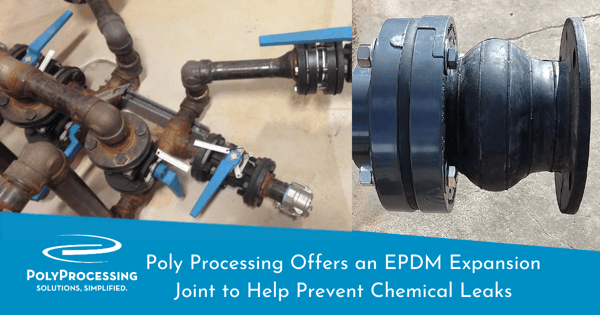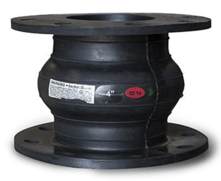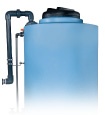Poly Processing Offers an EPDM Expansion Joint to Help Prevent Chemical Leaks
One of the biggest advantages of polyethylene chemical storage tanks is their flexibility. Polyethylene tanks expand and contract with hydrostatic pressure changes during loading and unloading and during changing weather conditions. While a rigid tank is more susceptible to cracking and damage over time, a flexible tank is resilient.

However, a polyethylene storage tank is only as good as the fittings and accessories you pair it with. For many years, the industry standard was hard piping that came directly into the side of the tank. Because hard piping won’t move with an expanding or contracting sidewall, it can damage a polyethylene tank in several ways:
- Piping vibration from pumps
- Fulcrums that crack the tank
- Hinge points that stress the tank
Flexible expansion joints allow the tank to move as it should while avoiding the damage that rigid piping can cause. (You’ll also need an isolation valve as a backup feature to prevent loss of product and to assist during inspection and maintenance.)
The All-new EPDM Expansion Joint
Poly Processing is introducing a new line of ethylene propylene diene monomer (EPDM) rubber expansion joints to our offerings. For applications where EPDM is acceptable, this solution can help reduce costs and protect against the loss of your stored chemicals.
Let’s take a look at the benefits of choosing the EPDM expansion joint.
Advantages of the EPDM Expansion Joint
Poly Processing’s EPDM expansion joint is specifically designed and built for plastic chemical storage tanks. The expansion joint:
- Absorbs directional movement. The joint allows axial compression, axial extension, lateral deflection, and angular and torsional movements.
- Absorbs vibration, noise, and shock. This protects your piping and other equipment from vibrational stress caused by mechanical equipment.
- Self-cleans its wide arch. The arch of the joint is wide enough to prevent buildup of solids.
- No metal. Poly Processing supplies PVC backing rings, to help protect against oxidizing from harsh chemicals.
- All EPDM. No liners, to avoid separation of materials.
Before Installing Your Flexible Connections
The fittings and accessories are a very important component of designing your chemical storage tank system. Before selecting a flexible connection, there are a few things to consider.
First, you need to understand the space requirements of your tank system. What will the total dimension be of the plumbing with the expansion joint and the tank system?
It’s also important for your flexible connection to be supported properly, but the support shouldn’t restrict the horizontal plane movement of the tank. When using an expansion joint, the pipe support should be placed after the flex to allow the tank to move outward when filled.
If you’re using flexible connectors, it is critical to specify them in the correct specification section. Sometimes engineers will specify flexible connectors in the plumbing specs but not in the tank spec. We recommend including any flexible connectors that you require in your tank specs as well, so we can see them, do a review on the specs, and design a proper tank system.
Once you’ve selected your flexible connection, install it in the correct spot. In most cases, flexible connectors only need to be installed on the lower third of the tank sidewall, since this is the section of the tank that moves the most.
For a flexible connector to serve its purpose, it has to be installed correctly and supported properly. Improperly installed expansion joints can put your chemical tank at risk. If a leak occurs at the joint, you won’t be able to shut off the flow and you will lose good product.
The EPDM expansion joint is available in 2-, 3-, 4- and 6-inch sizes. For more information about the expansion joint, contact a Poly Processing storage tank expert today.
- December 21, 2020
- Topics: Fittings and Accessories, Chemical Storage
About Poly Processing
Posts By Topic
Tech Talk Podcast Episodes
Subscribe By Email
Recent Posts
- Ferric Chloride Storage: What Operators Need to Know Before Choosing a Tank
- Wastewater Treatment: Modern Approaches to Sludge Removal & Chemical Management
- Why Cycling Causes Tank Failure: Tips for Prolonging Tank Life
- Small Changes in Tank Selection for Big Long-Term Cost Benefits
- NSF Certification vs. FDA Compliance: Understanding Chemical Tank Standards
Tank Configurator

Find the recommended tank and system components for your chemical storage challenge.
Configure a Tank Package





